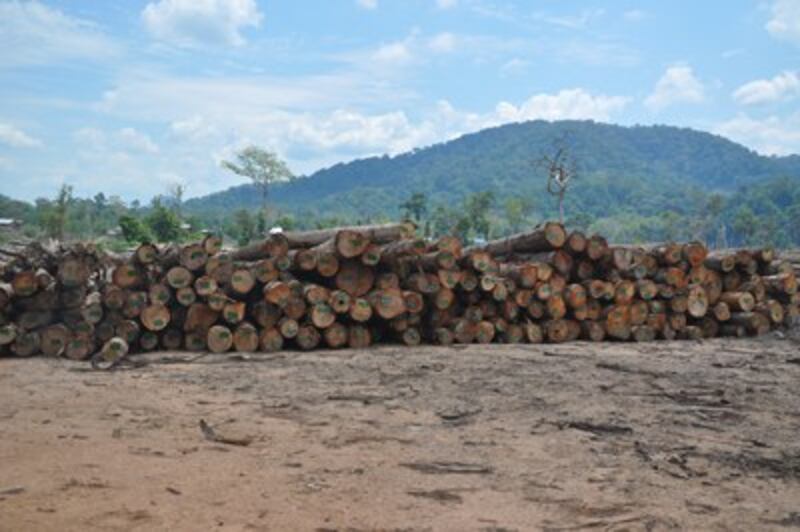Top government officials in Laos have been linked to the flourishing illegal timber trade between the country and neighboring Vietnam, according to sources who cite unofficial crossings along the border as conduits for the illicit activity.
“The smuggling of logs cannot be stopped because some of the Lao national leaders are involved in it,” an official who works at one of the non-governmental groups on forest conservation in the country told RFA’s Lao Service.
Some of the mining companies operating along the Champassak, Attappue and Saravan provinces in southern Laos claimed that some national leaders pressured enforcement officials not to take action against the smuggling activities.
When asked about the claims, an official who works in the investigation department at the Ministry of Agriculture and Forestry declined to comment.
The UK-based nongovernmental organization Environmental Investigation Agency (EIA) said the illegal timber trade had thrived so far because of poor enforcement by both Laos and Vietnam.
“The enforcement on the borders between Laos and Vietnam is very, very weak. The enforcement in Vietnam is very, very weak. So Vietnam is very willing to take timber smuggled from Laos into Vietnam.”
Chronic problem
Illegal logging and timber exports have long been a chronic problem in Laos.
A police report indicated that 257 cases related to the illegal trading of timber were discovered last year, topping an annual list of the country's economic-related crimes, the Vientiane Times reported.
To repopulate the nation’s forests, the government wants to reach forest coverage of 65 percent of the land by next year, and 70 percent by 2020, from the current 40 percent, according to an official estimate. One independent expert, however, says the current coverage is less than 30 percent.
The government reaffirmed its commitment to achieving the 65 percentage level at a November 2013 meeting with its development partners.
But at a roundtable meeting this month, development partners asked Lao government officials to conduct a proper assessment of current forest coverage based on accepted international definitions, a source who attended the meeting told RFA.
The integrity of Lao officials involved in the country’s afforestation efforts is also being questioned.
“Villagers do not trust government officials in afforestation campaigns, because when the trees are mature, national leaders order that they be cut,” said the NGO official who requested anonymity.
“Forest officials in practice find it difficult to seize and arrest timber smugglers, especially the big logging business that is backed by big politicians, or otherwise they will be removed if they block the politicians’ interests,” the source said.

Permission and quotas
The government allows trees to be felled in areas where mining, road and electricity grid and hydropower dam construction projects are being implemented, reports say.
Although officials must give permission to businesses to log in certain areas and place quotas on the amount of wood they can produce, the reports say some firms are believed to cut down trees from areas that are not permitted by law.
One of the ways in which illegal logging takes place is that businesses hire villagers to cut down trees and sell the timber to them, according to the Vientiane Times.
The timber is often moved though unofficial border crossings with neighboring Vietnam to bypass inspections, according to sources. The growing timber demand from Vietnam and China and other countries in the region has strained Lao forests.
The government prohibits export of logs to boost domestic supplies to wood processing plants and add value by processing wood products to increase their price before exporting them, according to the Vientiane Times.
“The amount of logs in the field never matches the permitted quotas because the officials who issue the permission always want a share of the interest in logging,” the NGO official said. “Therefore, the company that received permission must extract more logs for officials.”
Pilot program
As part of the government’s efforts to crack down on illegal logging, Lao officials introduced a pilot program in July in the southern provinces of Savannakhet and Saravan (also known as Salavan), which border Vietnam, to track the source of timber from sawmills and wood-processing plants.
The scheme came about after Lao Prime Minister Thongsing Thammavong disclosed that illegal logging had become a major problem for the country, according to reports.
The pilot program requires all logs in sawmills and wood-processing plants to be inspected before export and a framework to ensure logs are derived from legal sources.
Another source told RFA that in Savannakhet, military officials—not forestry officials—have taken advantage of the situation to inspect logging trucks and extort money from smugglers.
“In the meantime, logging in the province is out of control,” said the source, who did not want to be identified. “Local authorities have conspired with the smugglers to carry out logging without quotas.”
In some instances, foreign investors are participating in the illegal export of unprocessed logs.
“A Chinese investor has operated a sawmill in Luang Namtha province [in northern Laos, bordering China and Myanmar] and still exporting unprocessed logs although the government has declared that only processed logs can be exported.
“That is against the government’s regulations on the exporting of wood, and the central government must investigate this issue,” the source, who wanted to remain unnamed, said.
Reported by Ounkeo Souksavanh for RFA’s Lao Service. Translated by Ounkeo Souksavanh. Written in English by Roseanne Gerin.

